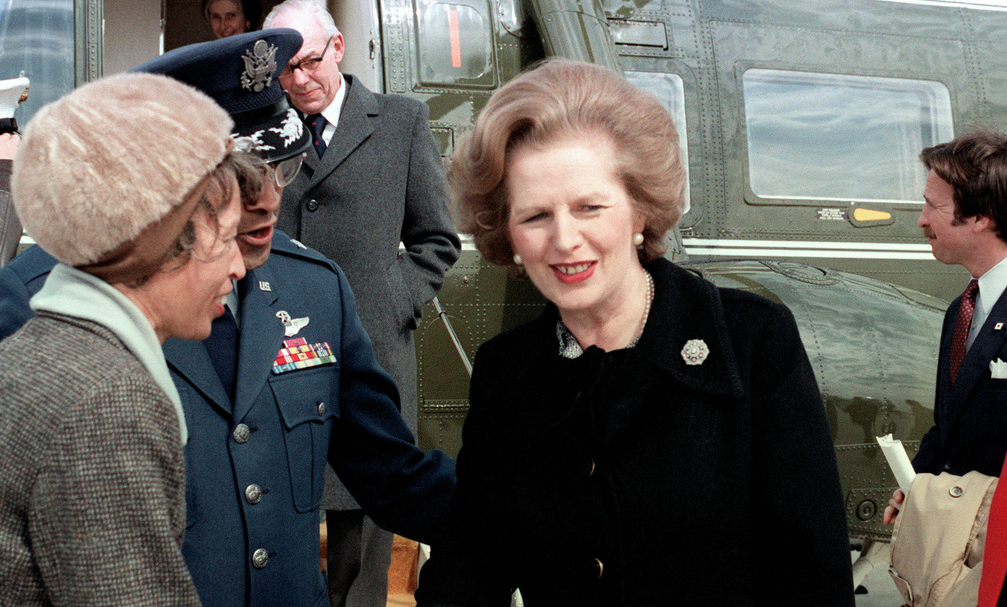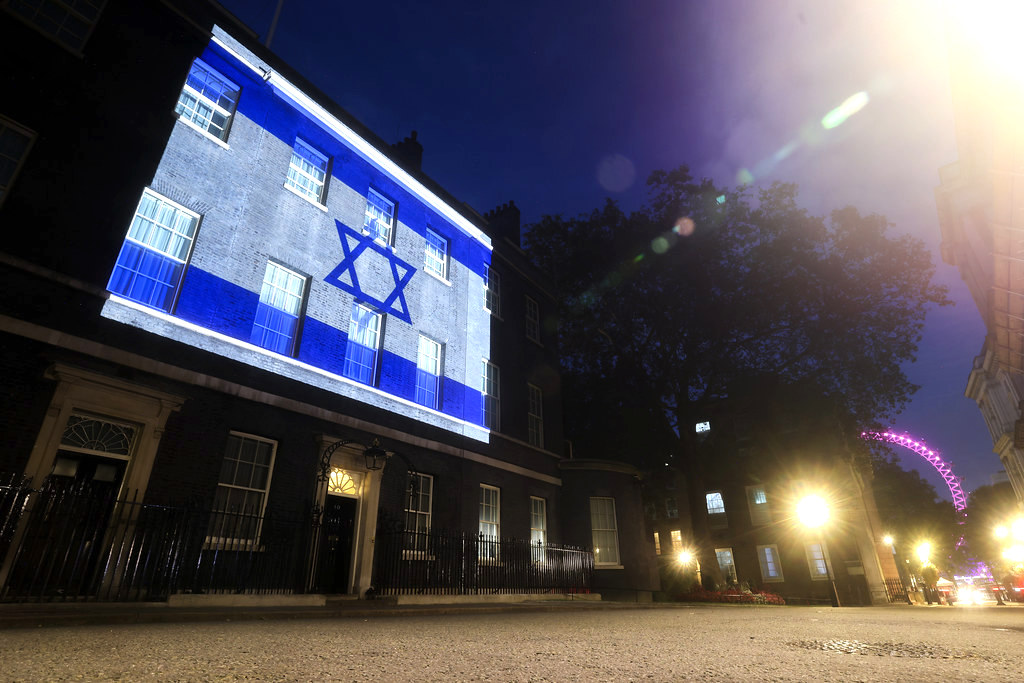As Downing Street endorses Netanyahu’s “mighty vengeance,” David Cronin provides a briefing on Britain’s support for Israel since 1948, which has involved a number of twists.
U.K. Prime Minister Rishi Sunak with Israel’s Prime Minister in London in March. (Simon Walker, No 10 Downing Street, CC BY-NC-ND 2.0)
By David Cronin
Declassified UK
 Rishi Sunak has given Britain’s full approval to the flattening of Gaza.
Rishi Sunak has given Britain’s full approval to the flattening of Gaza.
Late on Oct. 7, the prime minister tweeted “we stand unequivocally with Israel.” Sunak had expressed “full solidarity” to Benjamin Netanyahu, the tweet added.
As Netanyahu had promised “mighty vengeance” following the Hamas-led offensive that morning, there was no room for doubt about the signal which Sunak was sending.
In a few words, Sunak took Britain’s foreign policy to a new extreme.
Israel’s “mighty vengeance” is shaping up to be its most destructive bombardment ever of Gaza and its 2.3 million inhabitants.
A “mighty vengeance” endorsed by 10 Downing Street.
There is a long history of the U.K. supporting Israel’s wars.
‘A Real Act of War’
Through the 1917 Balfour Declaration, Britain sponsored the Zionist colonisation project. Ruling Palestine from the 1920s to the 1940s, Britain took a series of concrete steps towards realising the project’s objectives. In so doing, Britain paved the way for the Nakba, the mass expulsion of Palestinians.
[Related: AS`AD AbuKHALIL: The Hundred Years’ War on Palestine]
Yet since Israel was formally established in 1948, Britain’s relationship with that state has involved a number of twists.
[Ed.: An “anti-Zionist” British Foreign Office opposed the creation of the State of Israel, according to the book The 1945-1952 British Government’s Opposition to Zionism and the Emergent State of Israel.]
In 1956, Britain and France used Israel to do their dirty work.
At a secret meeting in Sevres – a Parisian suburb – during October that year, a plan was hatched to attack Egypt over its nationalisation of the Suez Canal Company (an Anglo-French firm and a key player in international shipping).
Moshe Dayan, the Israeli military chief who took part in those discussions, subsequently revealed that the plan put on the table there was presented as a British initiative. Selwyn Lloyd, then Britain’s foreign secretary, advocated that Israel commit “a real act of war,” Dayan wrote in his memoirs.
Donate to CN’s Fall Fund Drive
The Israeli attack on Egypt – and the skullduggery by Britain and France – drew an irate response from the U.S. As the dominant world power, it could not countenance the notion of Britain acting without its authorisation.
Under U.S. pressure, a ceasefire was called later in 1956 – though not before such horrors as a few massacres in Gaza.
The Suez fiasco put Britain in its place. It was of pivotal importance in making Britain behave as a junior partner to the American superpower.
[Related: AS`AD AbuKHALIL: Saudi-Iran Deal a Possible US ‘Suez Moment’]
Labour’s Friends of Israel
 Despite being told off for its underhand dealings, Britain kept on providing valuable assistance to Israel. Harold Wilson was a keen admirer of Zionism. That can be seen in his book The Chariot of Israel.
Despite being told off for its underhand dealings, Britain kept on providing valuable assistance to Israel. Harold Wilson was a keen admirer of Zionism. That can be seen in his book The Chariot of Israel.
The government which Wilson led in the 1960s proved accommodating to Israeli requests for arms. Hundreds of Centurions – British-made battle tanks – were delivered to Israel between 1965 and 1967.
During June 1967, Israel used those tanks in its invasion of Arab territories.
Israeli military commanders were “handsome” in praising the tank, it has been documented. The tank “apparently did far more than was ever expected of it,” a memo drawn up by the British embassy in Tel Aviv stated.
The June 1967 war was the beginning of a military occupation of the West Bank (including East Jerusalem), Gaza and the Golan Heights which persists to this day.
The numerous British statements that have subsequently been issued against the occupation – and, in particular, the construction of settlements – must be viewed sceptically. The truth is that the occupation was enabled by British weapons and that the British political elite was pleased with that fact.
A key, though little-known, British document on Israel dates from May 1968. Penned by Michael Stewart, then foreign secretary, it stated that “the survival of Israel as a separate state is a fundamental aspect of our Middle East policy.”

Israeli tanks advancing on the Golan Heights in June 1967. (Government Press Office of Israel, Wikimedia Commons, CC BY-SA 4.0)
The document nonetheless indicated that Britain also wished to cultivate strong relations with Arab countries. For that reason, it recommended Britain should maintain an “approximate balance of military strength” between Israel and its neighbours.
1973 & 1982
Such thinking explains how Britain responded to the October 1973 war between Israel and a number of Arab states, headed by Egypt.
On that occasion, Britain halted weapons supplies both to Israel and several of its Arab enemies.
U.S. planes taking arms to Israel were even prevented from landing in British military bases. The measure was necessary, Washington was told, as Britain did not wish to antagonise Arab oil providers on which it had become dependent.
Margaret Thatcher was Britain’s prime minister – and waging her own war to retain the Falkland Islands – when Israel invaded Lebanon in 1982.

Thatcher in the U.S. in 1981. (U.S. National Archives)
Her thoughts on the invasion can be found in a letter to Ronald Reagan, then the U.S. president. She contended that there was “an urgent need for a balanced policy” and that “unlimited support for Israel can only lead to growing polarisation and despair in the Arab world.”
If not unlimited, Britain had given Israel significant support ahead of the invasion. More than 100 Israeli soldiers received training in Britain between 1981 and 1982.
A July 1982 memo from Britain’s Ministry of Defence confirmed that the Israelis “have been sharing with us their latest battle experience.”
Such eagerness to learn from Israeli tactics were at odds with public statements. Thatcher denounced the massacres in the Sabra and Shatila – Beirut-area camps for Palestinian refugees – as an “act of sheer barbarism.”
The massacres were carried out by Israel’s Lebanese allies the Phalange and with Israeli assistance. Thatcher’s reaction – whether sincere or not – is, therefore, probably the strongest denunciation of Israel or an Israeli proxy by a British prime minister.
Mandatory Support

The U.K. prime minister’s office with a light show of the Israeli flag on Oct. 10. (Rory Arnold, No 10 Downing Street, CC BY-NC-ND 2.0)
Tony Blair – whom Thatcher regarded with great affection – never dared to direct a similar message towards Israel.
Instead, the prime minister enthusiastically backed Israel’s 2006 war on Lebanon. Reflecting on that war in his memoirs, Blair claimed Israel’s soldiers were engaged in an epic struggle between “modernity and atavism.”
It should be recalled that Blair encountered pushback from his party colleagues over his support for Israeli aggression. Blair even complained that he “suffered” (his word) for his stance, which “probably did me more damage than anything since Iraq.”
Rishi Sunak is unlikely to suffer for his embrace of Israel. Applauding Israel is considered mandatory in 2023 for the leaders of Britain’s two main parties.
There is little hope that the British political elite will do a U-turn and start taking Palestinian rights seriously. Change can only come through mass mobilisation by ordinary people in Britain or anywhere else.
David Cronin is an associate editor of The Electronic Intifada, a website focused on Palestine. His latest book is Balfour’s Shadow: A Century of British Support of Zionism and Israel.
This article is from Declassified UK.
Post Disclaimer | Support Us
Support Us
The sailanmuslim.com web site entirely supported by individual donors and well wishers. If you regularly visit this site and wish to show your appreciation, or if you wish to see further development of sailanmuslim.com, please donate us
IMPORTANT : All content hosted on sailanmuslim.com is solely for non-commercial purposes and with the permission of original copyright holders. Any other use of the hosted content, such as for financial gain, requires express approval from the copyright owners.
 Sri lanka Muslims Web Portal Sri Lanka Muslims News Center
Sri lanka Muslims Web Portal Sri Lanka Muslims News Center
 Donate
Donate


